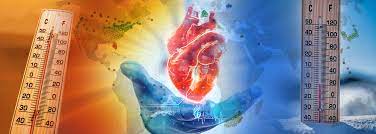
This raises the possibility of dying from a heart attack...

Does a change in the weather raise the risk of a heart attack? There isn't any conclusive proof of this. However, heart attack cases frequently rise sharply during the winter. According to scientists, this is because the heart is under more strain in the winter. Additionally, there is not enough oxygen. Pain in the chest begins.
Fatigue, lightheadedness, and chest pain can all be early signs of a heart attack. Winter health issues are common, especially for people with diabetes, asthma, lung infections, or any other chronic illness. It is very difficult for the heart to pump blood because of the shortage of oxygen. This raises the possibility of dying from a heart attack.
Heart attack symptoms may include chest discomfort, constriction, hand, jaw, and flatulence brought on by an abrupt change in weather. Do not disregard these signs as gas-related issues. Other heart attack symptoms include excessive perspiration, nausea and vomiting, exhaustion, and disorientation. A person should take extra care of themselves in light of the changing weather and pollutants if they have a chronic illness or a family history of heart attacks.
Genetic factors can potentially contribute to heart attacks.
Ten percent of heart attacks occur without any prior symptoms. He nevertheless has a heart attack. A hereditary basis may also exist for this type of heart attack. A person's body may not exhibit some signs if there is a family history of heart attacks.




 click and follow Indiaherald WhatsApp channel
click and follow Indiaherald WhatsApp channel